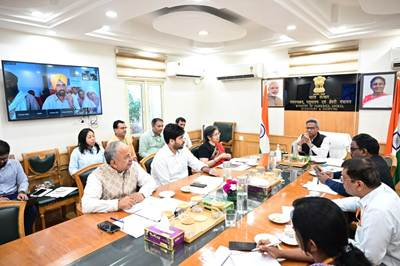DAHD Promotes Ethno Veterinary Medicine for Livestock on 10th Ayurveda Day
The programme was chaired by Shri Naresh Pal Gangwar, Secretary, DAHD, who underlined the importance of mainstreaming Ayurveda in livestock healthcare.

- Country:
- India
The Department of Animal Husbandry and Dairying (DAHD), under the Ministry of Fisheries, Animal Husbandry and Dairying, organized a virtual awareness programme on Ethno Veterinary Medicine (EVM) for livestock farmers on 23rd September 2025. The event, held through the Common Service Centres (CSC) network, was part of the celebrations of the 10th Ayurveda Day, observed this year on the theme “Ayurveda for People and Planet.” The programme marked a milestone in India’s efforts to integrate traditional knowledge with modern veterinary practices, bringing together over one lakh livestock farmers from more than 2,000 CSC centres across 23 States and Union Territories.
Leadership and Participation
The programme was chaired by Shri Naresh Pal Gangwar, Secretary, DAHD, who underlined the importance of mainstreaming Ayurveda in livestock healthcare. In his remarks, Shri Gangwar stressed that antibiotic resistance is emerging as a global challenge, affecting not only human health but also livestock productivity. He highlighted Ethno Veterinary Medicine as a sustainable, eco-friendly, and cost-effective alternative that can complement modern veterinary science.
He also interacted with farmers, listening to their concerns about access to veterinary services, and discussed ways to make EVM adoption easier and more practical at the grassroots level. Farmers were encouraged to use locally available herbs and traditional remedies as part of their routine livestock care.
Emphasis on Bovine Mastitis and Antimicrobial Resistance
Ms. Varsha Joshi, Additional Secretary, DAHD, delivered a special address highlighting the application of EVM in the treatment of bovine mastitis, one of the most common and costly diseases affecting dairy cattle. She explained that herbal formulations and traditional remedies have shown proven efficacy in reducing infections, thereby cutting down dependence on antibiotics.
She further stressed that reducing antibiotic overuse is central to the fight against antimicrobial resistance (AMR)—a pressing concern for global public health. By promoting traditional herbal treatments, farmers can not only safeguard animal health but also ensure that milk and dairy products remain free from harmful antibiotic residues. According to her, wider adoption of EVM can result in economic savings, healthier livestock, and a more resilient dairy sector.
Ayurveda and Sustainable Practices
The programme was also a platform to highlight the broader vision of Ayurveda in ensuring the sustainable use of natural resources, promoting the conservation of medicinal plants and biodiversity, and encouraging the integration of indigenous knowledge with modern science. Farmers were introduced to simple, Ayurveda-based remedies that can be applied to address common livestock ailments, thereby empowering them with low-cost, effective, and locally adaptable solutions.
Part of a Larger National Effort
This initiative forms part of DAHD’s continuous efforts to promote sustainable livestock health management. The department has been working on developing awareness campaigns, farmer training sessions, and collaborative programmes with Ayurveda experts to scale up the use of EVM across India. With more than one lakh farmers participating in a single virtual session, the programme demonstrated the transformative role of digital networks like CSCs in delivering knowledge and awareness to rural communities.
The virtual awareness programme on Ethno Veterinary Medicine reaffirmed the Government of India’s commitment to integrating traditional knowledge with modern practices for a healthier, sustainable livestock sector. By linking Ayurveda with animal health, DAHD is taking a forward-looking approach that not only addresses the challenges of antibiotic resistance but also supports biodiversity conservation, rural livelihoods, and food safety.










